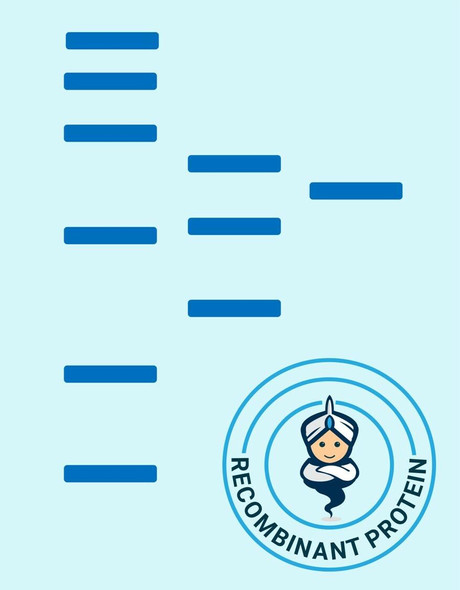Hormones Recombinant Proteins
Human TSH Recombinant Protein (RPPB1385)
- SKU:
- RPPB1385
- Product Type:
- Recombinant Protein
- Species:
- Human
- Research Area:
- Hormones
Description
| Product Name: | Human TSH Recombinant Protein |
| Product Code: | RPPB1385 |
| Size: | 10µg |
| Species: | Human |
| Target: | TSH |
| Synonyms: | Glycoprotein hormones alpha chain, Anterior pituitary glycoprotein hormones common subunit alpha, Follitropin alpha chain, Follicle-stimulating hormone alpha chain, FSH-alpha, Lutropin alpha chain, Luteinizing hormone alpha chain, LSH-alpha, Thyrotropin alpha chain, Thyroid-stimulating hormone alpha chain, TSH-alpha, Choriogonadotropin alpha chain, Chorionic gonadotrophin alpha subunit, CG-alpha, Thyrotropin subunit beta, Thyroid-stimulating hormone subunit beta, TSH-beta, TSH-B, Thyrotropin beta chain, Thyrotropin alfa. |
| Source: | Human pituitary glands |
| Physical Appearance: | Sterile Filtered White lyophilized (freeze-dried) powder. |
| Formulation: | Lyophilized from a concentrated solution containing 50mM ammonium bicarbonate. |
| Solubility: | It is recommended to reconstitute the lyophilized TSH in�10mM sodium phosphate, 150mM NaCl & 1 mg/ml BSA, pH 7.4. |
| Stability: | Lyophilized TSH although stable at room temperature for 3 weeks, should be stored desiccated below -18°C. Upon reconstitution TSH should be stored at 4°C between 2-7 days and for future use below -18°C. For long term storage it is recommended to add a carrier protein (0.1% HSA or BSA).Please prevent freeze-thaw cycles. |
| Purity: | Greater than 95% as determined by SDS-PAGE. |
| Biological Activity: | 11.72 IU/mg vial by Centaur CP. Siemens Centaur CP is standardized against WHO 3rd IRP 81/565. |
Thyroid-stimulating hormone (also known as TSH or thyrotropin) is a hormone synthesized and secreted by thyrotrope cells in the anterior pituitary gland which regulates the endocrine function of the thyroid gland.TSH stimulates the thyroid gland to secrete the hormones thyroxine (T4) and triiodothyronine (T3). TSH production is controlled by a Thyrotropin Releasing Hormone, (TRH), which is manufactured in the hypothalamus and transported to the Anterior Pituitary gland, where it increases TSH production and release. Somatostatin is also produced by the hypothalamus, and has an opposite effect on the pituitary production of TSH, decreasing or inhibiting its release.The level of Thyroid hormones (T3 and T4) in the blood have an additional effect on the pituitary release of TSH, When the levels of T3 and T4 are low, the production of TSH is increased, and conversely, when levels of T3 and T4 are high, then TSH production is decreased. This effect creates a regulatory negative feedback loop.TSH is a glycoprotein and consists of two subunits, the alpha and the beta subunit.The�a (alpha) subunit is identical to that of human chorionic gonadotropin (HCG), luteinising hormone (LH), follicle-stimulating hormone (FSH). The�b (beta) subunit is unique to TSH, and therefore determines its function.�
Thyroid Stimulating Hormone Human produced in Human pituitary glands is an important indicator of thyroid function.






